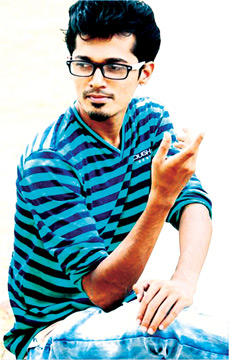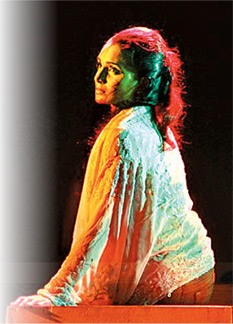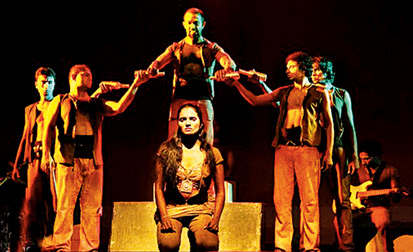|
Review
Ravana Husma Langa:
Whispering the mightiness of true love
By Dilshan Boange
The word Ravana inspires manifold reactions and sentiments on both
sides of the Palk Strait. A name revered by some, and reviled by others.
A name that predates known history, and destined perhaps to last till
human memory exists on earth.
 The Sinhala play Ravana Husma Langa (Near the breath of Ravana)
written and directed by Akhila Sapumal, is actually not a play based on
the life and times of the enigmatic King Ravana, except that he is
referred to in the context of a love story which the lovers Kassapa and
Nilupul co-narrate to each other and declare to be the greatest love
story in the Lankan history. The Sinhala play Ravana Husma Langa (Near the breath of Ravana)
written and directed by Akhila Sapumal, is actually not a play based on
the life and times of the enigmatic King Ravana, except that he is
referred to in the context of a love story which the lovers Kassapa and
Nilupul co-narrate to each other and declare to be the greatest love
story in the Lankan history.
The creative licence adopted by the playwright shows that there is a
notable imaginative pulse that carved out kernels related to the image
and story of King Ravana and embedded them in the text of the play.
One example is how the lovers speak of King Ravana’s wife being one
Princess Rishipaali. From the sources I have referred, his wife is said
to be ‘Mandodari’ who was the daughter of Mayasura a powerful Asura king
who was the architect to the gods.
An interesting point of critical discussion that the playwright
brings on the boards is how the ‘Ravana resurgence’ of the present times
have come up with some rather absurd notions which lend to in my opinion
to a ‘nonsensical cultism’ which has seen the ‘emergence’ of several
‘direct descendants’ of King Ravana’s lineage to the public domain and
discourse, including even those who claim that King Ravana in fact has
now arisen from his millennia long hibernation.
Sources
‘Kassapa Vijayanayaka’ the lead male in the story is one such Ravana
researcher who theorises in his undergrad dissertation about what Ravana
era history was, without substantiation through valid sources. This
element is telling of how academic institutions and ‘knowledge
production’ can be severely scrutinised for the authority they purport
to have.
Now, as I recapture in my mind, the essences of that play, which I
watched on August 12 at the Tower Hall, Maradana, I feel it is apt to
cite an excerpt from a poem by the 13th century Sufi poet ‘Rumi’ who has
said - “Do not be satisfied with stories that come before you. Unfold
your own myth.”
This path of freedom of thought hinted at by Rumi, gives credence to
be unconstrained in one’s goal to birth a story narrative, to create
through recreation of stories past and stories made anew.
The playwright Sapumal has in that sense allowed his creative senses
to unfold. What I saw to be a modern critique of how love, power, the
state, and history can find a strange convergence for conflict and
coexistence in a given moment of an individual’s state of being. The
individual being, the democratically elected ‘people’s representative’
Kassapa Vijayanayake.
Darkness
Under the gentle darkness of the Tower Hall, as I watched the drama
unfold in ‘colour’, ‘form’, and ‘flesh’ on the boards, I saw how the
story carries in its ‘heart’ the theme of love and its manifold
afflictions which become bound to lovers through the course of their
lives. In the veins of the play are burning questions related to love:
can it exist unconditionally in a pure form unaffected by factors such
as ‘power lust’ and hunger for fame and stature, which are compelling
human desires as well?
Can love be ‘apolitical’? Can love be a tool of the crafty over the
naïve?
Can love be completely divorced from man’s politics? It is in the
context of raising such compelling questions that the playwright
delivers in the subtext of the play an indisputable truth - love as we
know it today, cannot exist without the State.
 The simple reason being that everything we call our ‘way of life’,
our ‘order of things’ or our ‘civilisation’ which facilitates human
existence as we know it today, are in fact ‘facets’ of the State, which
can be thought of as the human requirements for ‘order’ to function
collectively with interdependence between people that ensures individual
survival. The simple reason being that everything we call our ‘way of life’,
our ‘order of things’ or our ‘civilisation’ which facilitates human
existence as we know it today, are in fact ‘facets’ of the State, which
can be thought of as the human requirements for ‘order’ to function
collectively with interdependence between people that ensures individual
survival.
But when one brings in the element of ‘power’ into a discourse about
‘love’, at the outset it may seem disdainful to the devoted lover to
imagine ‘true love’ can be touched by the human reality called ‘power’,
which is generally perceived as a destructive desire. However, like
‘love’, power too is a desire that defines the human who may at times
lust for power not as a means to an end but as an end in itself. The
‘feeling’ alone can be the ‘gain’, the ‘goal’, which is yearned for.
Like ‘love’, ‘power’ can be a very fulfilling feeling to the human
being.
Empowerment
Is love empowerment? Does it empower lovers or does is it
disempowering; leaving them broken? These are questions that the viewer
is delivered by the very ‘text’ of the play through the characters of
Kassapa and Nilupul and their lives which are intercut with a narrative
that predates their times, but is marked as the ‘beginning of history’
in our country.
This analogical narrative meant to juxtapose the lovers Kassapa and
Nilupul is none other than the story of Prince Vijaya from the Kingdom
of Lata ruled by King Singhabahu which is part of modern day West Bengal
in India, and Princess Kuveni of Lanka, who was the sister of the ruler
of the island nation which is heir to the legacy of King Ravana.
The narrative technique devised by Sapumal is one where Kassapa
(whose surname is interestingly ‘Vijayanayaka’ a Sinhala surname that
merges the name of the father of the Sinhala race with the Sinhala word
for leader -‘Nayaka’) inhabits Prince Vijaya’s image in the critique of
love, power and betrayal.
Like Princess Kuveni was discarded by Prince Vijaya to consolidate
his hold over the State of Lanka and become supreme ruler, Kassapa too
finds a dilemma after being elected to office, when his cohorts who
helped him rise to power, see his love affair with Nilupul being an
impediment for his political progress since the discrepancies of class,
wealth and standing in society between them may discredit the image
Kassapa has developed as a leader of the oppressed.
The play portrays a Prince Vijaya who was the victim of not only his
own ego and power lust but also the moral obligation to followers who
hold him morally bound to their wishes on the basis that they faithfully
followed him to exile swearing an oath of undying allegiance to him.
Political trickery
Did Prince Vijaya truly feel love for Kuveni at any point? Or was it
designed as political trickery from the very outset to the end? While
the playwright raises these rather sensitive questions one thing must
not be lost sight of from a critical perspective of gauging the play for
the parallels it attempts to draw between the two sets of lovers and
infer that history repeats itself in different forms.
And that is that what one finds in the life and objectives of Kassapa
engagingly played on stage by the director Akhila Sapumal himself, are
politics of the mundane, found all too commonly when any Sri Lankan
either picks up a newspaper or simply steps out on to the road and sees
the election canvassing landscapes which are inescapable.
What one must realise is that in the politics of Prince Vijaya what
is found at the very root of it, is statecraft which bore a Herculean
task of being a foundation to an entirely new form of nationhood
altogether.
|

A scene from the play |
Prince Vijaya’s politics was to birth a new nation state; which
cannot be likened and weighed out in juxtaposition to Kassapa’s goals of
being a people’s representative in the power folds of today’s party
politics of State. The outcomes, the destructions, the ignobleness and
glories or ignominies etc of these two scenarios are worlds apart, not
just in terms of chronology but also the particular merits and demerits
both would posses in their own respective objectives.
While the drama does not run a conventional narrative mode that
appeals to a viewer seeking a realist form, I wouldn’t be hasty to
classify it as one that is purely arty and cannot find viewership with
mainstream theatregoers if the play was restructured to meet certain
expectations. At times artistes tend to think that the less accessible
their work is to the average person, the more the work gains reputation
as being intellectually superior, and thereby serving the cause of a
‘higher art’ and not popular culture.
These are notions that any young practitioner in the arts can easily
be swayed by. Convolution of form can at times obscure the clarity of
content in a work of art like theatre or film.
In this regard I feel that this play can benefit greatly if the
playwright and director were to re-engage in assessing which scenes and
elements ensure the clarity of ideas of the story to flow as a narrative
devised for the stage. The narrative not being composed of only dialogue
but also song and some elements of dance performance.
Prosaic
The play had several songs which contained lyrics that were notably
prosaic. The ideas in the lyrical content could have been constructively
threaded to the text of the play as monologues or incorporated in
dialogue. A song to ‘work’ in a play can be a tricky thing.
It must prove itself worthy to be part of a drama narrative, as part
of ‘theatre language’ in two ways. Firstly it must display its merits as
a song that can carry itself in melody, music and lyrics and not be
merely dialogue being rhythmically spoken, which if so, could give the
drama the mould of a musical drama, which of course is a different
genre, to which Ravana Husma Langa cannot subscribe.
Secondly, a song in a play must ideally prove to have ‘functional’
purpose/value in the drama narrative, which may entertain the viewer
with a change of pace, and further the storyline by either conveying a
development in the plot, or stressing on a key thematic element of the
story which heightens the dramatic effect of performance.
For example, the song ‘Sirith virith’ in the Sinhala translation of
Fiddler on the Roof titled Vadakaya Wahala Uda, which I watched on
February 14, 2013 at the John de Silva auditorium, directed by Vijitha
Bandara.
That particular song which is performed as a ‘community expression’
with a dance works beautifully to further the understanding of the
social and cultural premise of the people, using a song as a device. And
that musical element possesses the indisputable constitution of a song
that can stand alone as a performance while being part of the story’s
narrative.
A song in a drama can occupy the mere position of an embellishment,
ornamentation, by virtue of being an entertaining ‘piece of
performance’, but that can render it as of course not indispensable to
the narrative of the story.
Abstract
I honestly felt that most of the song elements in Ravana Husma Langa
may have added some artistic embellishment to the fabric of the
performance and enriched its texture, but did a disservice in the form
of being somewhat abstract and thereby likely to distance the average
theatregoer when looked at from the point of expectations of the
mainstream viewer.
Definition
On the aspect of acting I hesitate to say that the cast was equally
balanced in terms of acting talent. But at the same time I will note for
the record that this performance must be seen in the light of an amateur
production, which has not the strength of a stellar cast of seasoned
artists as one would see in a play like Dolahak which is the Sinhala
translation of Reginald Rose’s Twelve Angry Men produced to the Sinhala
stage as a translation by Athula Pathirana, which received much acclaim
from theatregoers and critics alike.
However, it would be unjust of me if I fail to mention that Uthpala
Jayavikrama who handled the dual task of switching between the
characters of Nilupul and Princess Kuveni, performed commendably,
showing notable prowess as a stage drama actress. I would unhesitatingly
say she took the crown for acting in that production.
What has Sapumal and his team achieved through the production of
Ravana Husma Langa in the light of what I saw and discussed in this
review? While I shall leave the reader to decide based on what I have
critically discussed whether this play has potential to appeal to more
general audiences, there is no doubt that the solid food for thought
which the play offers is truly appreciable and must be saluted as a work
that carries deep echoes of what it means to be ‘human’; a creature who
by nature is defined in Aristotelian thought as ‘political’.
At a time when there are more and more Sinhala translations of
foreign plays capturing centre stage in the realm of theatre, and
original plays begin to recede in numbers, Ravana Husma Langa must be
saluted for its originality.
Sapumal’s creation is certainly not merely a number that adds to the
list of original plays done today, but an artistically innovative,
original play which can be hailed for the boldness it possesses not only
in theme and content but in the attempts to offer newness to present day
theatre in our country.
In conclusion if one were to return to the play’s central themes and
contentions and wonder how King Ravana fits into the scheme? It becomes
subtly evident.
The play suggests that in the history of our country it was only the
love story of King Ravana and beloved Rishipaali that can claim to have
had perfect harmony as a pristine love story that wasn’t traumatised by
the injuries of power play of the State.
Power
King Ravana is held in Lankan lore as an incomparable figure of might
and power. Is it only those of such tremendous strength as King Ravana
who offer love that is never shaken off course due to distractions of
power lust? Nilupul claims that King Ravana did not seduce Princess Sita
whom he abducted in retribution to the insult done him by Prince Rama
her husband, because he was completely in love with Rishipaali and would
never betray his love to her by seeking pleasure with another woman.
When true love is found as that between King Ravana and his
Rishipaali nothing can come between those lovers. That love cannot be
ousted by any other contender as status or power. Thus the play whispers
to us, that the truest love that existed was the love between Ravana and
Rishipaali. But then that was in a time before known time. Yet it is all
too convenient and unromantic to call it purely a ‘myth’, dismiss as
unreal, utterly fictional, and thereby suggest to lovers today that true
and enduring love is mythical. That is why, Akhila Sapumal, as an
artist, did not submit to the authority of stories that come before us.
And instead, chose to unfold his own. |

